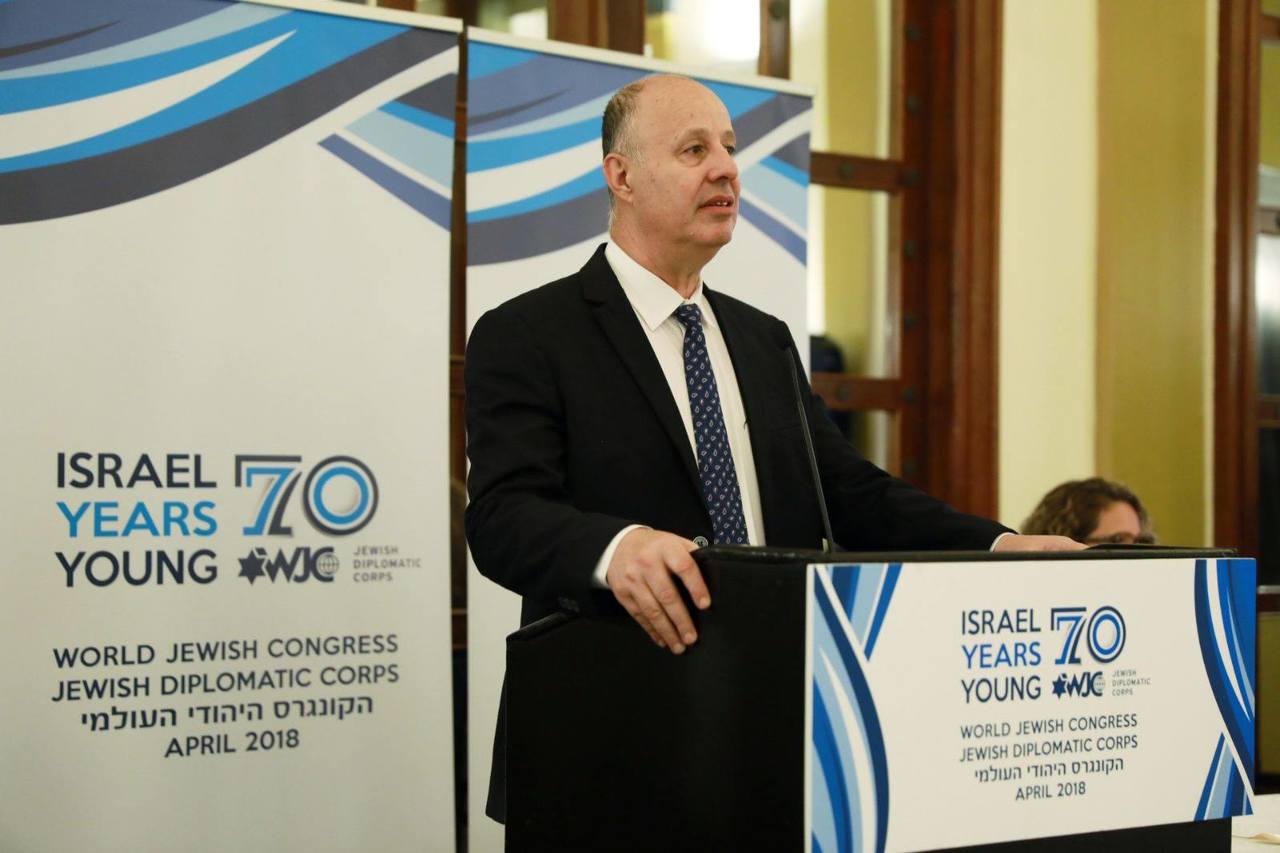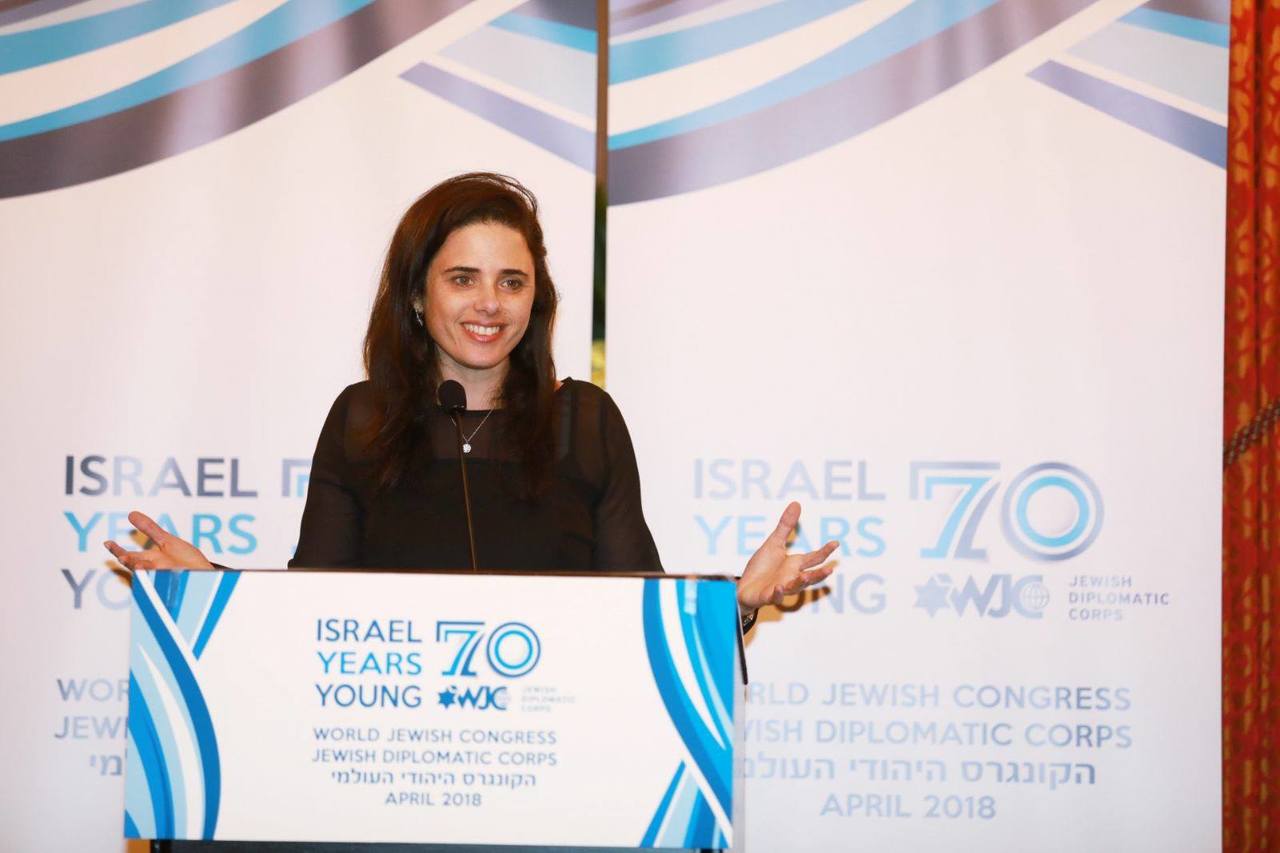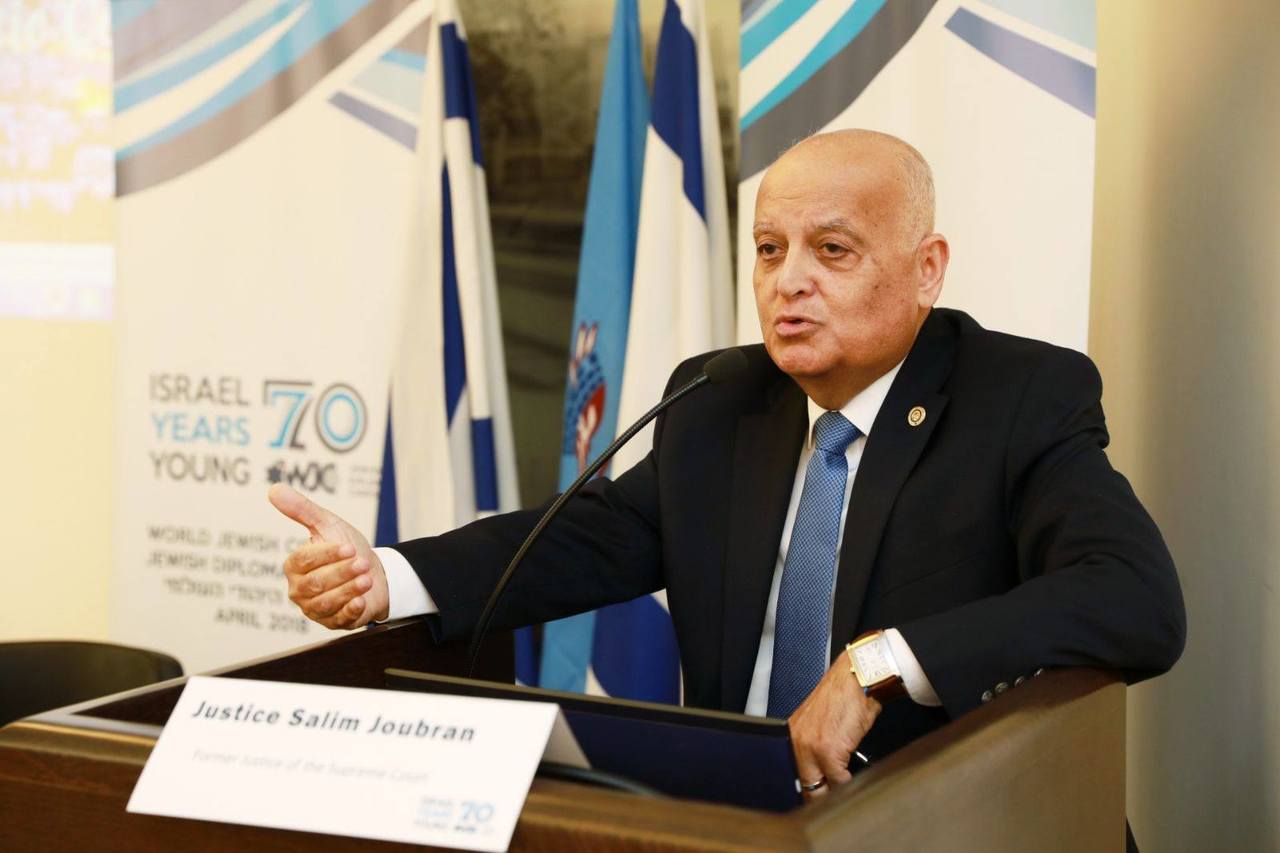Israel, 70 years young: WJC Jewish Diplomats reflect on 70th anniversary mission to Israel
10 May 2018The World Jewish Congress hosted in Israel last month more than 100 members of its flagship program the WJC Jewish Diplomatic Corps – an elite group of professionals aged 27-45 from more than 40 countries – to celebrate the 70th anniversary of the State of Israel, under the banner, “Israel, 70 years young.”

Over the course of the three-day mission, the WJC Jewish Diplomatic Corps visited Jerusalem, Tel Aviv, and Haifa, and engaged with leaders of Israeli society in government, academia, media, faith communities, business and young leadership on issues including regional and security developments in Israel and the Middle East, models of coexistence, drivers of innovation and academic excellence, and Israel in the eyes of the international media.
Below is a report written by the WJC Jewish Diplomats and edited by WJC Jewish Diplomat Aviva Klompas (US), reflecting on the sessions during of the mission:
SUNDAY, 15 APRIL 2018
Location: The King David Hotel, Jerusalem
REGIONAL DEVELOPMENTS IN ISRAEL’S NEIGHBORHOOD
Address by Roy Folkman, M.K., Former Deputy Mayor of Jerusalem
“Jerusalem - A Unique Intersection of Values and Communities”
Written by WJC Jewish Diplomat Fabio Milman (Brazil):
The WJC Jewish Diplomatic Corps' celebration of Israel's 70th anniversary is off to a great start. Fittingly, our morning began with a discussion of collaboration between the Jewish diaspora and the Jewish state.
Member of Knesset Roy Folkman, from the Kulanu party, shared his vision for the State, one that calls for greater collaboration to overcome the damaging forces of extremism. His presentation offered food for thought, and left us feeling optimistic on the social innovations being cultivated.

Address by Tzachi Hanegbi, M.K., Minister of Regional Cooperation
"Opportunities and Potential for Regional Development”
Written by WJC Jewish Diplomat Eugen Balin (Germany):
MK Tzachi Hanegbi, Israel’s Minister of Regional Cooperation, addressed the WJC Jewish Diplomats in honor of Israel’s 70th Independence Day.
MK Hanegbi made a compelling case that while the threats in the North from Hezbollah, Iran and Syria, and in the South from Hamas, are of grave concern, there is more to Israel than conflict and combatting terrorism.
We must remember that Israel is built on the Jewish value of tikkun olam - repairing the world. We are about bringing light to shine in dark places, and we do so by innovating and sharing our solutions in science and technology. We are, without question, the Start-Up Nation and we are making the world a better place.
Israel at 70 - Perspectives on Equality from the Knesset
Nurit Koren, M.K., Likud
Pnina Tamano-Shata, M.K., Yesh Atid
Ksenia Svetlova, M.K., Zionist Union
WJC Jewish Diplomat Moderator: Yariv Nornberg
Written by WJC Jewish Diplomat Philip Rosenberg (UK):
The WJC Jewish Diplomats enjoyed an engaging panel on gender equality from Knesset Members Nurit Koren (Likud), Pnina Tamano-Shata (Yesh Atid), and Ksenia Svetlova (Zionist Union), with WJC Jewish Diplomat Yariv Nornberg (Israel) as the moderator.
Three rising stars from Israel’s most gender diverse Knesset - 34 women out of 120 Knesset Members (there’s still room to grow!) - outlined their priorities for improving equality in Israeli society.
All three women come from traditionally under-represented communities - Yemenite, Ethiopian and Russian.
MK Nurit Koren is focused on putting more women in positions of power, including in politics, the judiciary, the army and business. She believes that even the traditional ‘domestic’ role of women provides a good foundation for strong political skills, because effective parenting requires negotiation and persuasion.
MK Pnina Tamano-Shata spoke about the adversity that Ethiopians faced coming to Israel, and today they face new challenges of prejudice and discrimination. She feels a unique responsibility to speak out as she represents many groups: her political party, gender, ethnicity, and one of very few black Jewish leaders.
MK Ksenia Svetlova pointed out that some ultra-orthodox parties do not allow women to stand for the Knesset as it is seen as immodest, and she is working to pass a law to address this issue. She believes women should be encouraged to move away from traditional ‘silent’ roles and in to positions of leadership - and these positions should come with equal pay to their male counterparts. She ventured that it might even help the peace process if women have more leadership roles in the process.
All three MKs agree that real equality means that men should be afforded greater responsibilities and more legal with respect to family life.
Keynote address by Ayelet Shaked, M.K., Minister of Justice

“Israel at 70 – A Light Upon the Nations”
Written by WJC Jewish Diplomat Andras Buchler (Hungary):
The WJC Jewish Diplomats had the pleasure of hearing from Israel’s Minister of Justice Ayelet Shaked. This past week we celebrated Yom Ha’atzmaut, and Minister Shaked urged us to look around and see Israel with wise eyes and an open mind. She noted that Israel is just one of 21 countries in the world that was established as a democracy. Her talk offers yet another reason to celebrate Israel’s remarkable history as we celebrate its 70th anniversary.
MONDAY, 16 APRIL 2017
HAIFA AS A MODEL FOR COEXISTENCE
Location: Haifa City Hall
Remarks by Professor Yossi Ben-Artzi, Former Rector of Haifa University
“The evolution of Haifa as the metropolis of northern Israel and a model for co-existence”
Written by WJC Jewish Diplomat Maria Kopelyan (Russia):
Our morning started in Haifa City Hall with a presentation entitled, "Haifa as a possible model for co-existence" by Professor Yossi Ben-Artzi, former rector of Haifa Unuversity.

Professor Ben-Artzi, spoke about the history of Haifa, which he describes as one of the youngest and most beautiful of Israel’s cities. He described the evolution of Haifa from the mid-18th century to the present day, and the roles played by Arabs, Europeans, Jews, and Christians in developing the city. Haifa has long been an important hub in the Middle-Eastern, boasting the region’s largest harbor and a railway connecting Cairo and Damascus.
Professor Ben-Artzi sees Haifa as a model of peace and tolerance; one that can serve as a model for other cities.
Address by Justice Salim Joubran, former Justice of the Supreme Court of Israel
“Insights on Diversity in the Israeli Justice System”
Written by WJC staff:
Justice Salim Joubran, former judge on the Supreme Court of Israel, delivered an address to a WJC Jewish Diplomatic Corps delegation gathered at Haifa’s City Hall, in honor of Israel’s 70th Independence Day.
He was appointed as a permanent member to the Supreme Court in 2004, becoming the first Israeli Arab to hold the position. The Justice is hopeful that in the future many more Israeli Arab judges will follow in his footsteps.
A proud resident of Haifa, Justice Joubran spoke about human rights and supporting Israel’s minority communities as they are integral members of society.
Building bridges today for a better tomorrow
Joshua Lincoln, Secretary General of the Baha'i International Community
Asaf Ron, Director of Beit Hagefen
Imad Telhami, Founder and Chairman Babcom Centers
Amir Muhammad Sharif Ode, Head of Ahmadiyya Haifa
WJC Jewish Diplomat Moderator: Micky Fuhrmann
Written by WJC Jewish Diplomat Lisa Ventura (Switzerland):
The WJC Jewish Diplomats had the privilege of hearing from four special religious leaders who are fostering the cohesive and tolerant community that Haifa is known for.
Imad Telhami, Founder and Chairman of Babcom Centres, spoke about Haifa’s diversity - a city where every person has his or her place. He believes that when people live in harmony, society and the economy flourish.
Amir Muhammad Sharif Ode, Head of Ahmadiyya Haifa, shared his motto: “Love for all, hatred for none.” He believes Haifa’s harmonious co-existence lies in actively ensuring the meaningful participation of every religious group.
Assaf Ron, Director of Beit Hagefen, agreed with his co-panelists and attributes Haifa’s success to the strong desire of its inhabitants to coexist. He offered, as an example, the year 1993 when Hanukkah, Christmas and Ramadan fell on the same date, and all three religious communities celebrated together.
Joshua Lincoln, Secretary General of the Baha’i International Community, explained Haifa as place where humility and awareness meet. He believes that social cohesion starts with honest work and everyone’s contributions.
All four panelists agreed that Haifa is a special place that many other communities can learn from – a message that resonates deeply as we approach Israel’s 70th Independence Day.
Address by Yona Yahav, Mayor of Haifa

“Perspectives of Inclusion in a Modern City”
Written by WJC Jewish Diplomat Melina Rozenbaum (US):
The WJC Jewish Diplomats had the great honor of meeting with Haifa’s Mayor, Yona Yahav, in honor of Israel’s upcoming Independence Day. Yahav was born in Haifa during the British Mandate, studied law at the Hebrew University of Jerusalem and continued his studies at the University of London, where he served as Secretary General of the World Union of Jewish Students.
In 2003 Yahav was elected Mayor of Haifa, which he calls Israel’s most beautiful city. He shared that Haifa, “Is the only place in the world that is exercising coexistence in a daily basis,” and the model should be exported all over. When asked how he has been so successful, he answered, “Give minority groups maximum honor, and make them understand they are full partners in the work.”
Finally, Mayor Yahav proudly shared how he is developing Haifa in three ways: higher education, tourism, and a goal of becoming the global capital of biotech. We wish him every success!
ISRAEL – A FUTURE POWERED BY INNOVATION
Location: Technion – Israel Institute of Technology, Haifa
Address by Professor Aaron Ciechanover, Nobel Prize Laureate
“Inspiring the Next Generation of Pioneers”
Written by WJC Jewish Diplomat Elisa Trotta Gamus (Argentina):
Professor Aaron Ciechanover was introduced to the WJC Jewish Diplomats as having two distinguished qualities: he’s Jewish and he is a genius.
Professor Ciechanover is a Nobel Prize winner in chemistry who describes himself as a typical Israeli. Born in Haifa to immigrant parents, he joined the army, fought in two wars, and later attended medical school at the urging of his mother. During his residency, he realized that medicine wasn’t for him and he enrolled in a PhD program.

Today, his greatest sense of accomplishment is knowing that he made a discovery that is helping to heal people and save lives.
Professor Ciechanover reminded us that while Jews are just 0.2% of the global population, we have won 27% of the Nobel Prizes.
His presentation offered even more reminders of the many reasons we can celebrate as we celebrate Israel's 70th Independence Day.
Address by Mooly Eden, Chairman of the University of Haifa's Executive Committee and former director of Intel International
“Israeli Entrepreneurship in the Global Arena”
Written by WJC Jewish Diplomat Alexander Rosemberg (US):
Shmuel (Mooly) Eden gave an enthralling presentation to the WJC Jewish Diplomats on innovation and the Start Up Nation. He described how the seeds of innovation that were planted 20 years ago have blossomed into an ecosystem that Israel benefits from today.
The secret of this success? The combination of a culture that questions authority (chutzpah!) and a society that can manage from amidst chaos.
Mooly explained that we live in a world that doesn’t progress linearly, but rather exponentially. To succeed l, we need to take calculated risks to compete in a world that is ever changing.
Mooly left us wondering what risks Israel will take to plant the seeds of innovation that it will harvest 20 years into the future.
Discussion on the role of academia in the Start Up Nation
Professor Peretz Lavie, President of Technion
Professor Rafael Beyar, Director of Rambam Health Care Campus
WJC Jewish Diplomat Moderator: Youri Hazanov
Written by WJC Jewish Diplomat Eric Engelmayer (Luxembourg):
Speaking to a cohort of Jewish Diplomats from the WJC, Professor Peretz Lavie, President of The Technion, and Professor Rafael Beyar, Director of Rambam Health Care Campus, discussed the role of academia and the Start-Up Nation. They shared how Haifa’s culture of coexistence has been at the center of key developments in their institutions.
The Rambam Health Care Campus welcomes all Israelis, as well as, patients from Syria and the Palestinian Authority. It is a model of coexistence where Jews and Arabs work hand-in-hand every day to save lives.
As for the Technion, the late Russian tea merchant Kalonymous Zeev Wissotzky left a large fund in his will to help fund its construction. American philanthropist Jacob Schiff agreed to contribute the remaining funds on the condition that the school accept students irrespective of gender, religion or ethnicity.
Today, the two institutions actively cooperate to innovate in the medical field, and are recognized throughout the world for life-saving breakthroughs.
TUESDAY, 17 April 2018
Location: The Council for a Beautiful Israel, Tel Aviv

Brigadier General Ronen Manelis, IDF Spokesperson
“Getting the message across: the IDF and the International Media”
Written by WJC Jewish Diplomat Shana Meyerson (US):
The WJC Jewish Diplomats heard from Brig. General Ronen Manelis, who has the distinction of being the youngest IDF spokesman.
He shared three realities that Israel faces as it approaches its 70th anniversary.
First, the landscape of the Middle East is a complicated map of international powers acting outside their own borders. The Middle East, said Brig. General Manelis, is dictated by, “Social media, the Koran and the sword.”
Second, social media has created a new reality in which anyone with a smartphone can be a journalist. As a result, the IDF Spokesperson finds ways to speak directly to people and not just the press. The IDF communicates in five languages and via five major social media platforms.
Third, Israel fights both on the militarily front and on the media front to convey its messages. Since we live in the Information Age, the Spokesperson is challenged with getting accurate information out in a timely fashion.
The WJC Jewish Diplomats enjoyed hearing how we can improve our outreach and share positive and productive messages.
Udi Segal, Chief Political Analyst and Anchor, Reshet Media Ltd.
“The good news about Israel (that you won’t hear on CNN)”
Written by WJC Jewish Diplomat Gabriel Goldberg (France):
On their final day in Israel, the WJC Jewish Diplomats met with Udi Segal, Senior Diplomatic Analyst and Anchor of Reshet Media. He offered numerous examples of good news stories that CNN doesn’t cover because it doesn’t deem them newsworthy. Israel is making waves with its astounding innovations, strong economy, and lifestyle. It was even ranked the eleventh happiest country in the world. This is the side of Israel that Udi encouraged the WJC Jewish Diplomats to share.
On the security front, Israel is an unmatched regional superpower. Udi shared a famous photograph of Israeli fighter jets over Auschwitz – and said that many IDF officers have that photo hanging in their office to remind them of where we have been and where we are today. Udi’s presentation was refreshingly optimistic, recalling Golda Meir, who once said “Pessimism is a luxury that a Jew can never allow himself.”